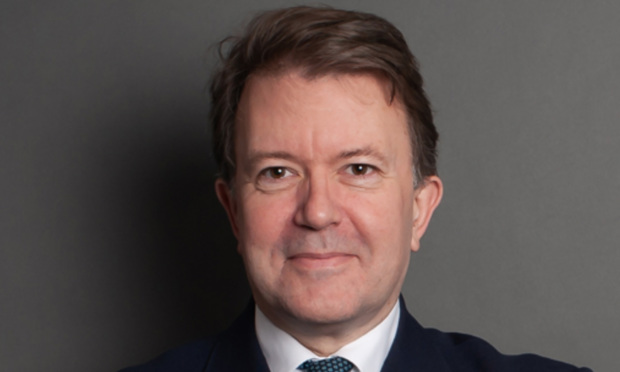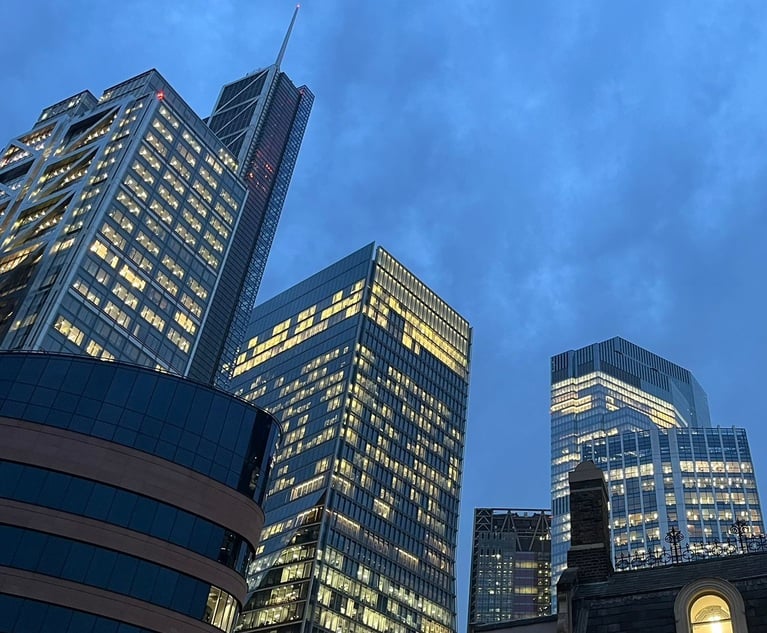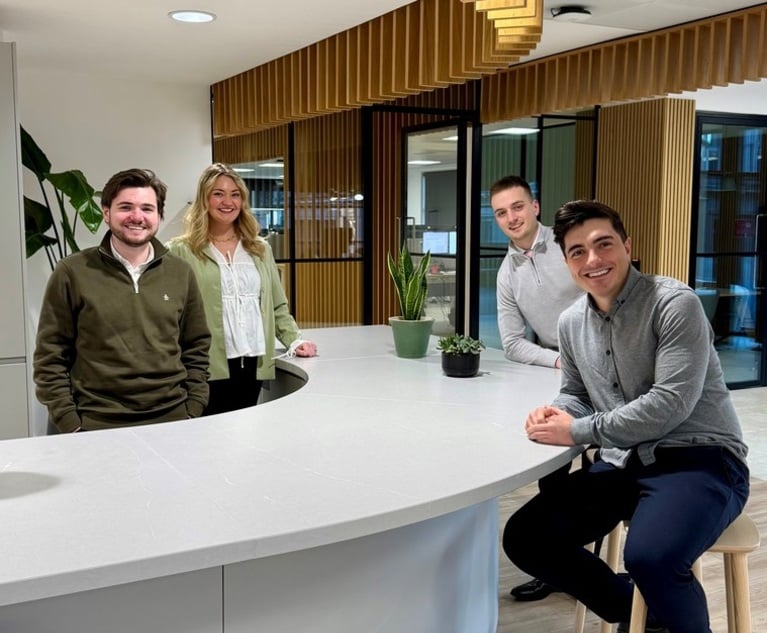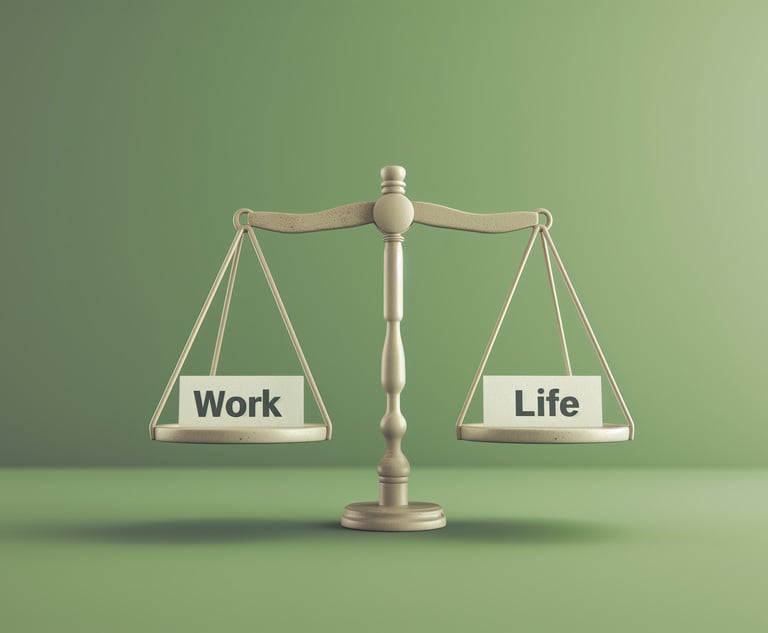'It's Like Having Your Batteries Taken Out' - A Bird & Bird Partner On Living (and Working) With COVID-19
The firm's international commercial group head talks about his attempts to keep busy and upbeat, despite his debilitating symptoms.
April 06, 2020 at 05:51 AM
4 minute read
 Simon Shooter, Bird & Bird's international commercial group head
Simon Shooter, Bird & Bird's international commercial group head
Three weeks ago, Bird & Bird's international commercial group head, Simon Shooter, developed COVID-19 symptoms. With the support of his family, and his friends in medicine, he has since been recuperating in self-isolation at home.
The coronavirus pandemic has torn through the world, touching lives across the globe, and, like most sectors, the legal industry is feeling the impact of both the professional and personal toll wrought by the pandemic.
Like a number of firms, Bird & Bird closed its London HQ over two weeks ago, and staff have been working remotely en masse ever since. Shooter talks to Law.com International from his home in Gloucester.
Stressing that no two people with the misfortune of contracting the virus will have exactly the same symptoms, Shooter describes his own experience of the past three weeks, the physical and mental challenges he's had to confront, and how he has managed to remain upbeat and working despite the sapping nature of the disease.
"You've got to listen to your body."
Shooter explains his frustration at not being able to identify the exact moment he contracted the virus. But he speculates that, although he hadn't travelled abroad, he did take "the tube everyday" before the lockdown, and had suffered "a bout of insomnia the week before" which may have left his immune system affected.
What is certain, however, is the pain and inertia he battled during the ensuing three weeks. He describes days where he "just lay in bed". He developed pleurisy, which causes difficulty breathing, and is "coming to the end of a very unpleasant chest infection".
"No one should underestimate how affecting this is. If you've had a bad bout, you can guarantee you will be weak."
Since contracting the virus, Shooter says he has lost 18 lbs.
"Together with the fevers, your body takes a hell of a pounding while you're recuperating." He adds: "You're given expectations which are not correct for everyone at all – rough guidelines. You ask yourself: "Am I going to get better.
But despite his symptoms, he has been working and keeping busy in other ways.
"The biggest impact on work is that there are a number of times, when it's raging, it's like someone has taken the batteries out of you – you power down."
He explains that, when the fever is running high, "your mental capacity, your intellectual alacrity and memory gets a pounding".
"You're doing well, but not as well as you think you are," he explains. "You have fogged up thinking, and it has a real effect on how diligently you work."
He gives the example of fighting a note for a client in a contract review: "I was about three-quarters of the way through it. But at about five o'clock, I conk out. I can't do any more. So I just left it."
He describes his clients as being "fantastically sensible and accommodating".
When asked why he chose to work instead of taking time off to recover, he says he "never felt there was a point where I was putting my health at risk," adding: "It was a judgement call. Your symptoms and how they affect you are utterly unpredictable. But you've got to listen to your body."
One essential means for "channeling boredom" has been to make himself useful while at home.
"I've never been ill for more than two or three days in a row. Now I've been ill for three weeks. Without keeping busy, I'd start climbing the walls!"
He describes how keeping in close contact with his colleagues and juniors has been helpful for both himself and the firm.
"Our juniors must be very worried. We're inevitably going to see a reduction in work levels, and juniors will worry they won't get the education and support that they would in the workspace. So I do one to two hours' tuition to the troops a week."
He adds: "We need to keep interacting with all staff to make sure they're safe, happy and feel a part of everything."
Read more:
This content has been archived. It is available through our partners, LexisNexis® and Bloomberg Law.
To view this content, please continue to their sites.
Not a Lexis Subscriber?
Subscribe Now
Not a Bloomberg Law Subscriber?
Subscribe Now
NOT FOR REPRINT
© 2025 ALM Global, LLC, All Rights Reserved. Request academic re-use from www.copyright.com. All other uses, submit a request to [email protected]. For more information visit Asset & Logo Licensing.
You Might Like
View All
‘Raises More Questions Than Answers’: Partners Puzzled by Leadership Change at UK Competition Regulator


Long Hours, Lack Of Boundaries: Associates In India Are Leaving Their Firms
Law Firms Mentioned
Trending Stories
- 1'Nation is in Trouble': NY Lawmakers Advance Bill to Set Parameters for Shielding Juror IDs in Criminal Matters
- 2Margolis Edelstein Broadens Leadership With New Co-Managing Partner
- 3Menendez Asks US Judge for Bond Pending Appeal of Criminal Conviction
- 4Onit Acquires Case and Matter Management Software Provider Legal Files Software
- 5As Nonprofits Plead for Answers, Dem AGs Plan Suit to Block Trump Funding Freeze
Who Got The Work
J. Brugh Lower of Gibbons has entered an appearance for industrial equipment supplier Devco Corporation in a pending trademark infringement lawsuit. The suit, accusing the defendant of selling knock-off Graco products, was filed Dec. 18 in New Jersey District Court by Rivkin Radler on behalf of Graco Inc. and Graco Minnesota. The case, assigned to U.S. District Judge Zahid N. Quraishi, is 3:24-cv-11294, Graco Inc. et al v. Devco Corporation.
Who Got The Work
Rebecca Maller-Stein and Kent A. Yalowitz of Arnold & Porter Kaye Scholer have entered their appearances for Hanaco Venture Capital and its executives, Lior Prosor and David Frankel, in a pending securities lawsuit. The action, filed on Dec. 24 in New York Southern District Court by Zell, Aron & Co. on behalf of Goldeneye Advisors, accuses the defendants of negligently and fraudulently managing the plaintiff's $1 million investment. The case, assigned to U.S. District Judge Vernon S. Broderick, is 1:24-cv-09918, Goldeneye Advisors, LLC v. Hanaco Venture Capital, Ltd. et al.
Who Got The Work
Attorneys from A&O Shearman has stepped in as defense counsel for Toronto-Dominion Bank and other defendants in a pending securities class action. The suit, filed Dec. 11 in New York Southern District Court by Bleichmar Fonti & Auld, accuses the defendants of concealing the bank's 'pervasive' deficiencies in regards to its compliance with the Bank Secrecy Act and the quality of its anti-money laundering controls. The case, assigned to U.S. District Judge Arun Subramanian, is 1:24-cv-09445, Gonzalez v. The Toronto-Dominion Bank et al.
Who Got The Work
Crown Castle International, a Pennsylvania company providing shared communications infrastructure, has turned to Luke D. Wolf of Gordon Rees Scully Mansukhani to fend off a pending breach-of-contract lawsuit. The court action, filed Nov. 25 in Michigan Eastern District Court by Hooper Hathaway PC on behalf of The Town Residences LLC, accuses Crown Castle of failing to transfer approximately $30,000 in utility payments from T-Mobile in breach of a roof-top lease and assignment agreement. The case, assigned to U.S. District Judge Susan K. Declercq, is 2:24-cv-13131, The Town Residences LLC v. T-Mobile US, Inc. et al.
Who Got The Work
Wilfred P. Coronato and Daniel M. Schwartz of McCarter & English have stepped in as defense counsel to Electrolux Home Products Inc. in a pending product liability lawsuit. The court action, filed Nov. 26 in New York Eastern District Court by Poulos Lopiccolo PC and Nagel Rice LLP on behalf of David Stern, alleges that the defendant's refrigerators’ drawers and shelving repeatedly break and fall apart within months after purchase. The case, assigned to U.S. District Judge Joan M. Azrack, is 2:24-cv-08204, Stern v. Electrolux Home Products, Inc.
Featured Firms
Law Offices of Gary Martin Hays & Associates, P.C.
(470) 294-1674
Law Offices of Mark E. Salomone
(857) 444-6468
Smith & Hassler
(713) 739-1250









